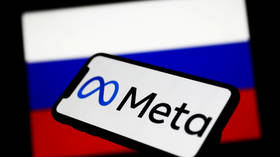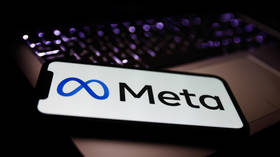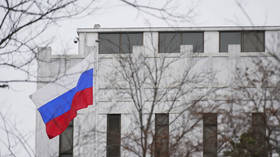UN blasts Meta for allowing hate speech against Russians

The United Nations has condemned the move by Meta to allow hateful remarks and calls for violence against certain Russians, with Stephane Dujarric, the spokesman for the UN Secretary-General Antonio Guterres, stating that the international body does not condone such calls coming from any side.
“We stand clearly against all hate speech, all calls for violence. That kind of language is just unacceptable from whichever quarter it comes from,” Dujarric said during a news briefing on Friday.
Meta, meanwhile, tried to downplay the impact of its controversial move, with the social media giant’s President for Global Affairs and former British Deputy PM Nick Clegg releasing a statement to clarify the decision. The main goal of the platform was to enable Ukrainians to vent their anger over the Russian offensive, he claimed, describing the decision as a “temporary” measure.
“I want to be crystal clear: Our policies are focused on protecting people's rights to speech as an expression of self-defense in reaction to a military invasion of their country. The fact is, if we applied our standard content policies without any adjustments we would now be removing content from ordinary Ukrainians expressing their resistance and fury at the invading military forces, which would rightly be viewed as unacceptable,” Clegg stated.
The policy will be applied only “in Ukraine itself,” he went on. It was not immediately clear whether residents of other countries would be allowed to express their “fury” and call for violence against Russian troops and President Vladimir Putin as well, or whether the hateful content would be available for viewing outside Ukraine.
There is no change at all in our policies on hate speech as far as the Russian people are concerned. We will not tolerate Russophobia or any kind of discrimination, harassment or violence towards Russians on our platform.
Last month, Facebook revised its policies against dangerous individuals and organizations, allowing posts praising the Azov Battalion, Ukraine’s National Guards unit, that incorporates hard-line nationalists and openly neo-Nazi fighters.
The latest change in Meta’s policy was first reported by Reuters on Thursday, citing internal emails from the parent company of Facebook and Instagram. While the agency originally claimed the platform allowed hate speech against all the Russians, it later toned down its article, explaining the measure related to “invading Russians” and Putin only.
The move has invoked fury in Russia, where Facebook was banned a few days ago over discrimination towards state-owned and state-affiliated Russian media outlets. Russia’s media watchdog Roskomnadzor targeted Instagram, with the platform set to go online on March 14. The Prosecutor General of Russia went even further, asking a court to outlaw Meta Platforms as a whole, designating it as an extremist organization.
The label would effectively put Facebook and Instagram in one row with actual terrorist groups, invoking the same penalties and restrictions. Using Facebook or other Meta platforms in good faith, however, would not be automatically considered an act of extremism, Ekaterina Mizulina, a member of the Civic Chamber of the Russian Federation, a body advising Russia’s government on civil society issues, has explained.















